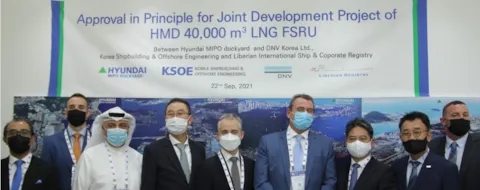DNV awards AiP to HMD for 40,000 CBM LNG FSRU
Hyundai Mipo Dockyard (HMD) and Korea Shipbuilding & Marine Engineering (KSOE) have received an Approval in Principle (AiP) from classification society DNV and the Liberian International Ship & Corporate Registry (LISCR) for a 40,000 CBM barge-type LNG Floating Storage Regasification Unit (FSRU). The AiP presentation ceremony was recently held at Gastech trade fair in Dubai.
The AiP is the result of a joint research project by HMD, KSOE, LISCR and DNV to develop a 40K barge-type LNG FSRU. Operated together with a large-size floating storage unit (FSU) and a shuttle LNG carrier, the newly developed 40,000 CBM unit would be suitable to serve mid-to-small-sized LNG projects as an economical alternative to large-size FSRUs. The barge-type FSRU design features an IMO type-C cargo containment system, while its cargo handling system would enable simultaneous loading and unloading of LNG cargo among FSU and LNG carrier.
“This solution optimizes the efficiency of FSRU operations in mid-and-small-sized LNG projects such as import terminals. The development of the 40K platform expands our portfolio and thus strengthens HMD’s position in the growing LNG market,” said Young Jun Nam, Chief Technology Officer of HMD.
“The Liberian Registry is proud to contribute with the Approval in Principle for this 40K LNG FSRU design that supports our joint pursuit to reduce GHG emissions both at sea and ashore,” said Thomas Klenum, Senior Vice President of Maritime Operations for the Liberian Registry. “It was a great pleasure to work on this project in close collaboration with other high quality and innovative stakeholders such as HMD, KSOE and DNV.”
“DNV is delighted to support HMD and KSOE in providing innovative solutions to the market, to enable greater decarbonization and help propel the world towards lower carbon energy sources,” said Vidar Dolonen, Regional Manager Korea & Japan in DNV Maritime. “An AiP can be an essential part of building market confidence in new designs, by demonstrating that it is grounded on the solid fundamentals of classification rules. We look forward to continuing to help this project develop by utilizing our expertise in maritime LNG.”
An Approval in Principle demonstrates there are no major technical showstoppers to realize a vessel’s design. It is carried out at an early stage of a concept development to confirm its feasibility.
